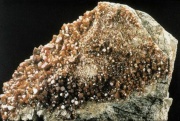Difference between revisions of "Lead vanadate"
Jump to navigation
Jump to search
(username removed) |
m (Text replace - "== Authority ==" to "== Sources Checked for Data in Record ==") |
||
| Line 28: | Line 28: | ||
Toxic by inhalation or ingestion. Skin contact may cause irritation or ulcers. Carcinogen, teratogen, suspected mutagen. | Toxic by inhalation or ingestion. Skin contact may cause irritation or ulcers. Carcinogen, teratogen, suspected mutagen. | ||
| − | == | + | == Sources Checked for Data in Record == |
* G.S.Brady, ''Materials Handbook'', McGraw-Hill Book Co., New York, 1971 Comment: p. 444 | * G.S.Brady, ''Materials Handbook'', McGraw-Hill Book Co., New York, 1971 Comment: p. 444 | ||
Revision as of 06:22, 1 May 2016
Description
A yellow powder that occurs naturally in the mineral vanadinite. Vanadinite is found in the southwestern United States, Mexico, and Spain. Lead vanadate is used as a pigment in industrial paints.
Synonyms and Related Terms
lead metavanadate; vanadinite; vanadato de plomo (Esp.); vanadate de plomb (Fr.); vanadato de chumbo (Port.)
Other Properties
Decomposes in nitric acid. Insoluble in water
| Composition | Pb(VO3)2 |
|---|---|
| CAS | 10099-79-3 |
| Molecular Weight | mol. wt. = 405.11 |
Hazards and Safety
Toxic by inhalation or ingestion. Skin contact may cause irritation or ulcers. Carcinogen, teratogen, suspected mutagen.
Sources Checked for Data in Record
- G.S.Brady, Materials Handbook, McGraw-Hill Book Co., New York, 1971 Comment: p. 444
- Richard S. Lewis, Hawley's Condensed Chemical Dictionary, Van Nostrand Reinhold, New York, 10th ed., 1993
- The Merck Index, Martha Windholz (ed.), Merck Research Labs, Rahway NJ, 10th edition, 1983 Comment: entry 5451
